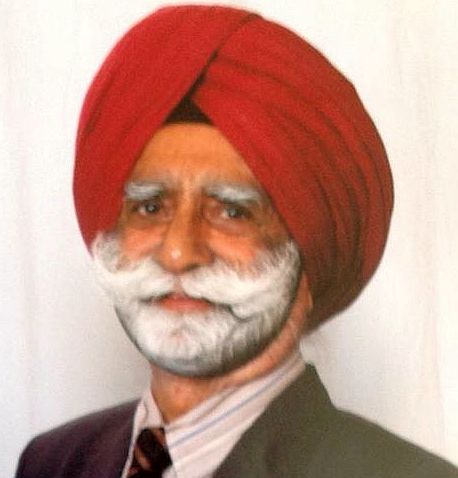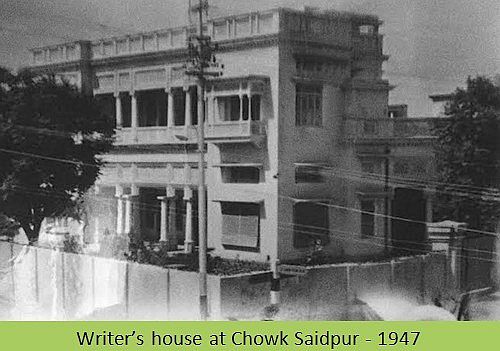From Khyber to Kanya Kumari
Category:

Kanwarjit Singh Malik was born in Rawalpindi in 1930. His family moved to India at the time of Partition in 1947. He joined the Flying Club in Jalandhar, and was later selected by the Indian Air Force. After the retirement from the Air Force, he served as a senior captain in Air India and Air Lanka. He got married in 1961, and now lives in Mumbai with his wife.
Pre-Partition life
My family had lived in Rawalpindi since the time of my great-grandfather, Malik Khazan Singh, who passed away in 1899 after amassing a large amount of property.
My father, Malik Mukhbain Singh, was a barrister, who had studied Law in the UK. He suffered from polio when he was 2 or 3 years old. He was treated in the UK while he was studying Law, but his condition did not improve. He was fitted with a brace, which he used to wear while going outside, and always walked with a stick.
My father and his younger brother Sardar Jaswant Singh Malik were the sons of my grandfather's first wife. My grandfather had two sons who were 17 and 12 years old when my grandmother passed away. Then, my grandfather remarried, and had three sons from my step grandmother, who passed away after Partition.
The eldest of these three sons, Mohinder Singh Malik, died in 1934 in a car accident when he was returning from a picnic\; at this time, he was on holiday from his studies in the UK.
In 1926, Father got involved in Sikh movements and came to know their leaders especially Master Tara Singh and all the Jathedars (leaders). As a result, his law practice suffered, but his influence with Muslim friends increased.
Consequently, in 1934/35, he was made a member of the newly formed Sikh Gurdwaras Judicial Commission in Lahore in 1934/35. Later, he served as the Chairman of the Commission for seven years. Therefore, he moved between Rawalpindi and Lahore, and he rented a bungalow at Mazang Road, Lahore.
We used to spend part of our school holidays in Lahore, My two older brothers, B S Malik and Prithipal Singh Malik, studied in Gordon College, Rawalpindi, and later in Government College and Forman Christian College in Lahore. B S Malik joined the Punjab Civil Services, but had to first join the Armed Forces, which was compulsory. He was holding the rank of Captain when he was recalled from Burma in 1945 to join his parent PCS service.
In 1936/37, we shifted to our newly built bungalow at Chowk Saidpur Road. It was located at the cross road of Saidpur Road and Asghar Mall Road.

I studied in Presentation Convent School in Cantonment, Singh Sabha School in Raja Bazar, Khalsa School near Bani Mai Veeran on Saidpur Road, and finally up to 10th class in Khalsa High School (now Muslim High School) near our bungalow.
During his Law studies in the UK, my father befriended many well-known personalities of that time. Pandit Nehru, Veer Savarkar, Dr. Kitchlew, Sir Sikandar Hayat Khan and so many other people were his contemporaries. So were the sons of the Sultans of Turkey who wanted to take him to Turkey and make him a Judge there (he used to tell us that he might have become a Muslim or have been killed during the revolution in Turkey). He was also the secretary of the students' Majlis in the UK.
Sir Sikandar Hayat, Nawab Muzaffar Khan and so many other prominent Muslims of at that time were his friends, and were regular visitors to our house at Mazang Road, in Lahore. Once Sir Sikandar Hayat (the Premier of undivided Punjab) visited us in Lahore, and gave me Rs. 5 to buy kites and reels. My father used to settle disputes of nearby Muslim villages\; his word was final, such was his influence, even though he was not a Muslim.
My father was also a Judge in the Princely State of Kapurthala. Due to too much work, he fell sick in Kapurthala, and returned to Rawalpindi in 1947.
In 1947, my parents, two of my brothers and I were in Rawalpindi and Lahore. I was a tenth grade student at that time. In March 1947, my eldest brother was posted as a 1st Class Magistrate in Cambellpore (Attock), after serving in Pindi and Muzaffargarh. In April 1947, he got married to Nirankari Baba Hara Singhji's youngest daughter, Balwant Kaur.
We had a peaceful, prosperous life with friends from all communities.
Troubles start
Communal riots broke out in Rawalpindi and neighbouring areas in March 1947. At this time, I remember seeing fires throughout the city from the roof of my home. Many people were killed, and many women were raped in the riots. Some parents killed their daughters to avoid dishonour, and some older women jumped into wells when their homes were set on fire.
However, the leaders did not learn from this, and the same scenes were repeated in August 1947. We became Azaad but none of the leaders on any side cared about the hardships and havoc that the people were facing.
School exams to be held in March 1947 were postponed to August 1947, and were never actually held.
In March 1947, when it was clear that you could be killed in riots, the ladies of our locality, along with children, came over to our bungalow thinking it will get over in a day or two. The men stayed back to guard their properties. Both Hindu and Sikh families came over, bringing vegetables or dals for cooking. Our home took on the atmosphere of a langar.
A day later, we heard reports that a big mob from nearby villages was heading towards our bungalow from the bani side. My father was recovering from his illness. But, he asked to be taken to the roadside. In spite of my mother's protests, he sat in a chair in front of our gate on Saidpur road. I stood near my father.
The mob appeared soon. Father sat there, facing them. On seeing my father, the slogan-shouting mob stopped and became quiet, Father recognized some of them, and called them over. He said, "Sharam karo, (have some sense of shame) where are you going with this mob?"
The leaders put their heads down, and vowed not to shout and create any mischief. They said that they were concerned that Hindu/Sikhs were going to torch the Jama Masjid. Then, they left.
This whole week was terrible.
Leaving for India
When Partition was announced in June 1947, my father did not want to leave Pindi. But, by early August 1947, it was clear that we were not safe in Pindi. My father was advised by his Muslim friends to leave Pindi.
On 11 August 1947, my mother, her three sons living in Pindi, including me, and my eldest brother's newly wedded wife, left for India by the Frontier Mail. We had with us one Sikh servant from Poonch (Kashmir).
Our baggage consisted of cooking utensils, some cutlery and crockery, one trunk each of Summer/winter clothes. We had bedding material in hold-all rolls.
We reached Saharanpur early morning next day. Then, we took a bus to Mussoorie. My father's younger brother, Jaswant Singh Malik, who was employed in Ahmedabad as Chief Municipal Engineer, had rented a bungalow for the season on top of Gun Hill, Mussoorie. My uncle was well known amongst the Sindhi families of pre-partition Karachi. In Ahmedabad, he was well known to Mr. H. M. Patel, Mr. G. V. Mavalankar, and through them to Sardar Patel. Just two days later, his leave finished, and he went back to Ahmedabad.
Along with us, there were three other families of close relations. It used to be great fun for the children. Little did we know that what we brought from Pindi would be the only thing we would ever get from our Pindi home.
My eldest brother, B. S. Malik, stayed behind in Campbellpore.
My father stayed behind in Pindi. He wanted to attend Court in Lahore on 14 August 1947, as he was the Chairman of Sikh Gurdwaras Judicial Commission. He boarded the Frontier Mail at Rawalpindi on the night of August 13. When he got down from the train in Lahore on 14 August, his two younger brothers, who were planning to go to Dehra Dun, noticed him, and forced him back on to the train.
Instead of Lahore, my father got down at Amritsar. Here he stayed with his close friend, Sardar Sampuran Singh Gill, who was later India's Deputy High Commissioner in Lahore.
My father had only Rs. 300 in his pocket, and nothing else. All his property including running business, houses, car, and tonga were left behind.
My father was 63 years old at that time. For him and for us, it was a new chapter in our lives.
Settled in Delhi
My eldest brother in Cambellpore used to go to a club near his home in his car with a Pathan servant till he was advised by Father's Muslim friends to refrain from doing so as things were getting hot for them, and their influence in the area had declined. He came to Pindi in September 1947, and stayed at our house there for a few days. Then, he flew to Delhi.
At that time, my father was staying in Delhi with a close relative and dear friend, Sardar Jaidev Singh at Raj Narain Road in Civil Lines, old Delhi. My eldest brother helped my father in exchanging our Rawalpindi property for a Delhi property owned by Khwaja M Atta Ulah, Bar at Law, who had shifted from his home to the safety of the nearby Maidens Hotel.
That is how we got a roof over our head. We moved to this home in October 1947. Initially, we did not have a cook, and Mother cooked for all of us.
Father resigned from the job of Chairman, Sikh Gurdwara Judicial Commission. He took over as Chairman of Army Pension Appeal Tribunal at Jalandhar. The salary from this job, plus the meagre Bank accounts shifted from Imperial Bank and Lakshmi Commercial Bank in 1947 gave us some financial relief.
As luck (or lack of it) would have it, the custodian of evacuee property, due some mischief, did not recognize the exchange of our Pindi home for our Delhi home. Father fought this case in his penniless state till the High Court\; his lawyer friends did not charge him any fees.
At one point, his lawyers suggested that he go to Pandit Nehru, India's Prime Minister.
I was present when my father replied to this suggestion. He said, "Jawahar lal [Nehru] knows Mukhbain Singh (my father) lives in Delhi. I am on the list of important persons of Delhi. I get invited every year to important functions. I will not approach Nehru. Let the court decide."
My father spent better part of his life after Partition on this case till we finally won.
My older brother, Prithipal Singh Malik, who was studying at the prestigious Mclagan Engineering College in Lahore (now University of Engineering and Technology, Lahore) joined Roorkee engineering college (now IIT Roorkee). After he got his degree, he joined the Indian Army's Electrical and Mechanical Engineers (EME) Corps, from which he retired as Col. P S Malik.
I joined college and the Flying Club in Jalandhar. I was later selected by the Indian Air Force in March 1952. We were now settled in India.
______________________________________
© Kanwarjit SIngh Malik 2015
Comments
Add new comment